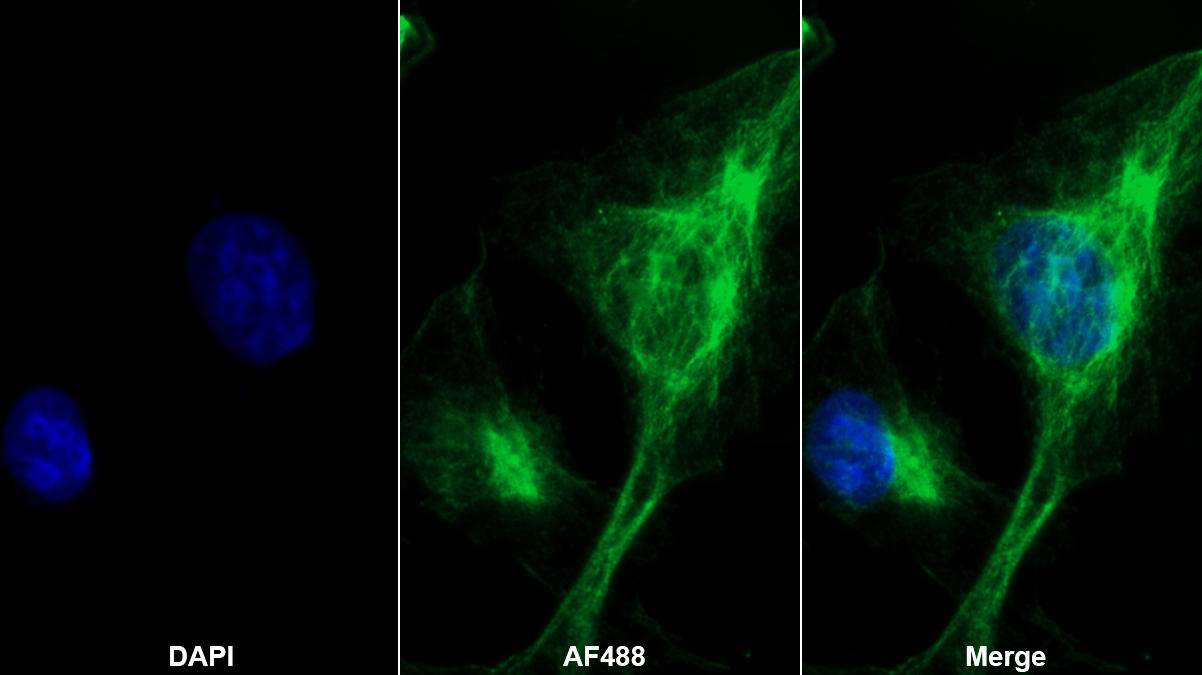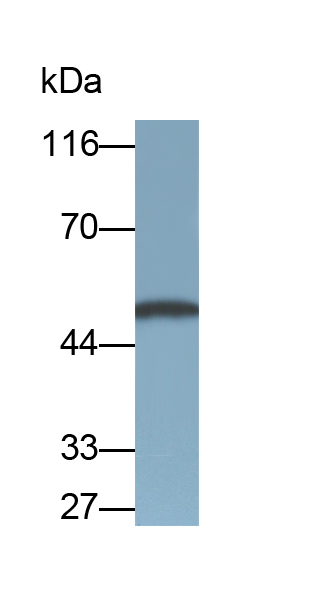Monoclonal Antibody to Myostatin (MSTN) 

GDF8; Growth Differentiation Factor 8
- UOM
- FOB US$ 127.00 US$ 295.00 US$ 422.00 US$ 1,055.00 US$ 4,220.00
- Quantity
Overview
Properties
- Product No.MAB653Bo21
- Organism SpeciesBos taurus; Bovine (Cattle) Same name, Different species.
- ApplicationsWB; ICC/IF
If the antibody is used in flow cytometry, please check FCM antibodies.
Research use only - DownloadInstruction Manual
- CategoryCytokineMetabolic pathwayBone metabolism
- SourceMonoclonal antibody preparation, Host Mouse
- Ig Isotype IgG2b Kappa, Clone Number 8#
- PurificationProtein A + Protein G affinity chromatography
- LabelNone
- Immunogen RPB653Bo01-Recombinant Myostatin (MSTN)
- Buffer FormulationPBS, pH7.4, containing 0.02% NaN3, 50% glycerol.
- TraitsLiquid, Concentration 1mg/mL
Sign into your account
Share a new citation as an author
Upload your experimental result
Review

Contact us
Please fill in the blank.
Specifity
The antibody is a mouse monoclonal antibody raised against MSTN. It has been selected for its ability to recognize MSTN in immunohistochemical staining and western blotting.
Usage
Western blotting: 0.01-2µg/mL;
Immunocytochemistry: 5-20µg/mL;
Optimal working dilutions must be determined by end user.
Storage
Store at 4°C for frequent use. Stored at -20°C in a manual defrost freezer for two year without detectable loss of activity. Avoid repeated freeze-thaw cycles.
Stability
The thermal stability is described by the loss rate. The loss rate was determined by accelerated thermal degradation test, that is, incubate the protein at 37°C for 48h, and no obvious degradation and precipitation were observed. The loss rate is less than 5% within the expiration date under appropriate storage condition.
Organism Species More: Homo sapiens (Human)Giveaways
Increment services
-
 Antibody Labeling Customized Service
Antibody Labeling Customized Service
-
 Protein A/G Purification Column
Protein A/G Purification Column
-
 Staining Solution for Cells and Tissue
Staining Solution for Cells and Tissue
-
 Positive Control for Antibody
Positive Control for Antibody
-
 Tissue/Sections Customized Service
Tissue/Sections Customized Service
-
 Phosphorylated Antibody Customized Service
Phosphorylated Antibody Customized Service
-
 Western Blot (WB) Experiment Service
Western Blot (WB) Experiment Service
-
 Immunohistochemistry (IHC) Experiment Service
Immunohistochemistry (IHC) Experiment Service
-
 Immunocytochemistry (ICC) Experiment Service
Immunocytochemistry (ICC) Experiment Service
-
 Flow Cytometry (FCM) Experiment Service
Flow Cytometry (FCM) Experiment Service
-
 Immunoprecipitation (IP) Experiment Service
Immunoprecipitation (IP) Experiment Service
-
 Immunofluorescence (IF) Experiment Service
Immunofluorescence (IF) Experiment Service
-
 Buffer
Buffer
-
 DAB Chromogen Kit
DAB Chromogen Kit
-
 SABC Kit
SABC Kit
-
 Long-arm Biotin Labeling Kit
Long-arm Biotin Labeling Kit
-
 Real Time PCR Experimental Service
Real Time PCR Experimental Service
Citations
- Anti-Myostatin Reduces Bone Mineral Loss in Ovariectomized RatsSapub:Source
- Short-term, high-fat diet accelerates disuse atrophy and protein degradation in a muscle-specific manner in micePubMed: 26539241
- Tumor inoculation site affects the development of cancer cachexia and muscle wastingPubMed: 26016447
- Induction of transient tenogenic phenotype of high density cultured human dermal fibroblastsPubMed: 25748814
- Higher Plasma Myostatin Levels in Cor Pulmonale Secondary to Chronic Obstructive Pulmonary DiseasePubmed:26998756
- The Effect of Vibration Treatments Combined with Teriparatide or Strontium Ranelate on Bone Healing and Muscle in Ovariectomized RatsPubmed:27272029
- Irisin and Myostatin Levels in Patients with Graves' Disease.pubmed:27986127
- Effect of Strontium Ranelate on the Muscle and Vertebrae of Ovariectomized Ratspubmed:29242963
- Compensatory anabolic signaling in the sarcopenia of experimental chronic arthritis.pubmed:28740214
- Fermented corn-soybean meal elevated IGF1 levels in grower-finisher pigsPubmed: 30203098
- Predictive value of serum myostatin for the severity and clinical outcome of heart failurePubmed: 31056368
- Resistance training‐induced muscle hypertrophy is mediated by TGF‐β1‐Smad signaling pathway in male Wistar ratsPubmed: 31960436
- Myostatin and muscle atrophy during chronic kidney diseasePubmed: 32974666
- Gender-Specific Behaviour in Obesity Stages I-II: Imbalance of Aminothiol Status and Adipomyokine Profile in Subjects with Different Insulin Resistance …34868459







